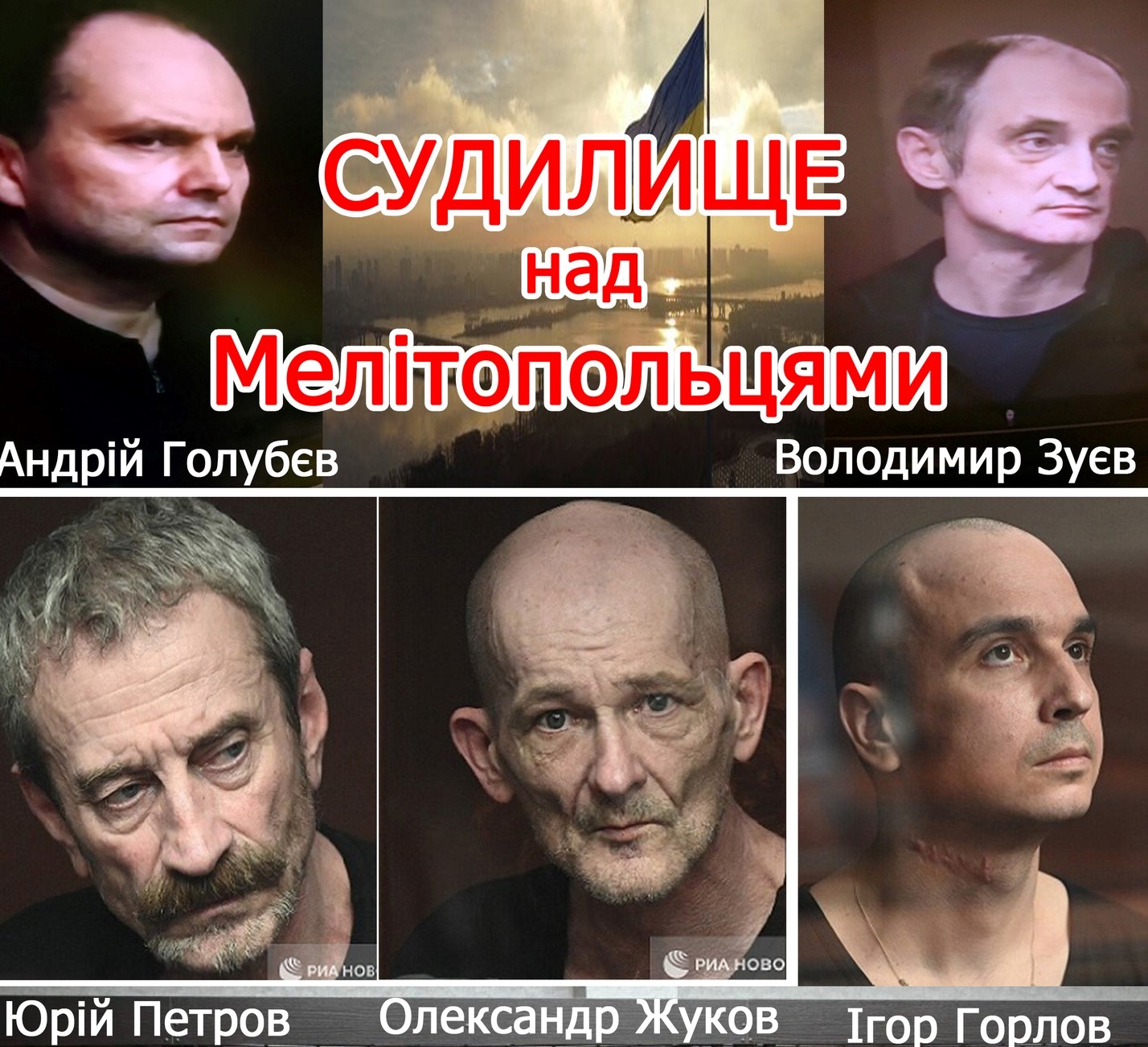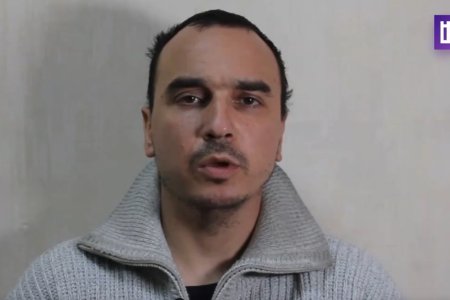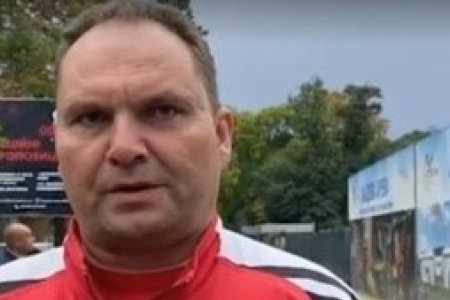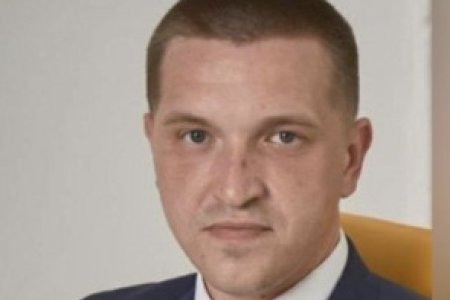
Yet another ‘trial’ with predetermined outcome has begun at the Southern District Military Court in Rostov, with five Ukrainians accused by the Russian aggressor state of ‘international terrorism’ and facing sentences of up to life imprisonment. Andriy Holubiev, Ihor Horlov; Yury Petrov, Volodymyr Zuyev and Oleksandr Zhukov were all abducted in April 2022 and almost certainly tortured while being held for many months without any access to lawyers or contact with their families.
Russia’s abduction and imprisonment of civilians is in flagrant violation of international law, and no attempt to claim that the men were guilty of so-called ‘international terrorism’ can change that. The charge of ‘acts of international terrorism’ was, seemingly, only added, as Article 361, to Russia’s criminal code, in 2016, and has thus far not led to any convictions. Such ‘an act of international terrorism’ is said to be an explosion, act of arson or other actions, committed outside Russia and jeopardizing the life, health, freedom or inviolability of Russian citizens “for the purpose of violating the peaceful co-existence of states and peoples, or aimed against the interests” of Russia. Since you can be convicted merely because of a supposed “threat to commit such actions”, the FSB can easily improve their ‘crime-fighting statistics’ by claiming to have thwarted entirely fictitious plans.
Russia clearly understood that military targets alone on territory which Russia had invaded would make the use of this charge problematical. The FSB therefore came up with a plan to attack civilians which it claimed to have prevented. The men were supposed to have been planning to blow up a vehicle carrying humanitarian aid. The alleged plan to stuff explosives into the front bumper of a car, and then detonate it when the ‘humanitarian convoy’ drove past had, purportedly, been on the instructions of Ukraine’s Security Service [SBU].
There are no grounds for finding this a credible ‘plot’. On the contrary, it is only Russia that has repeatedly targeted civilians, including people waiting in queues for humanitarian aid, or volunteers and people trying to flee the flooding after the deliberate destruction of the Kakhovka Dam. Had there been genuine evidence to back the charges of planning ‘an act of international terrorism under Articles 361 and 30 § 1, as well as of ‘taking part in a terrorist group’ (Article 205.4 § 2), there would have been no reason to hold the men incommunicado for so many months.
The Russian media, typically, reported the beginning of the ‘trial’ on 16 June 2023 in uncritical mode, with Kommersant’s title claiming that “the Melitopol underground have been gathered together in a Rostov court.’ The five men were all described as former or current Ukrainian military men or former border guards who were in units of the Territorial Offence; and are accused of “creating an anti-Russian terrorist underground.” Kommersant quotes the FSB as asserting a plan to blow up a car where humanitarian aid to the civilian population was being handed out, as well as a plan to use a grenade thrower against Russian military.
During the initial hearing, the prosecutor took around an hour to read out the charges with a large part of the indictment constituting a list of the weapons and explosives that the FSB claimed to have found.
The supposed organizer of this ‘terrorist organization’ is a person called Volodymyr Mynko, whose whereabouts are unknown. The five men abducted in April 2022 are claimed to have been members of the Union of Melitopol ATO [Ukraine’s Anti-terrorist operation in Donbas] veterans, which Mynko headed.
The prosecution claims that Mynko determined the place where the alleged attack on a humanitarian aid distribution place was to take place and that Ihor Horlov had prepared a bomb and planted it in a car. The five were, supposedly, also planning “to use a grenade thrower to shell military technology guarded by Russian military servicemen taking part in the humanitarian action.”
The plan was purportedly thwarted, with the FSB claiming to have found the car stuffed with explosives in Ihor Horlov’s garage. According to this FSB version, Horlov was ‘detained’ two weeks later by the Crimean FSB.
It is claimed that Oleksandr Zhukov’s role lay in looking for information about places where Russian soldiers, weapons, etc. were deployed, as well as other methods for carrying out a crime, or other instructions from Mynko.
Volodymyr Zuyev is 45 and an IT specialist who was working for a firm serving CCTV cameras. He is alleged to have helped his ‘accomplices’ follow the movements of Russian soldiers and to have passed on information about places where Russian forces were deployed.
Andriy Holubiev is claimed to have gathered information about the places and time that humanitarian aid was distributed.
It is also asserted that both Zuyev and Holubiev actively sought out other accomplices.
Yury Petrov is supposed to have been involved with secret hiding places for weapons.
Only Ihor Horlov partially admitted to the charges, namely the part about weapons. He dismissed the claim that there had ever been any civilian targets. The other men deny all of the charges. Both Horlov and Holubiev asked to be recognized as military servicemen, and to be treated in accordance with the Geneva Convention (regulating the treatment of prisoners of war.)
The men were asked by the judge to provide information about themselves. Holubiev called himself a sergeant of the Border Service; Horlov and Zhukov had served in Ukraine’s Armed Forces. Zuyev was in the Ukrainian Territorial Defence reserves, while 62-year-old Petrov had been in the Armed Forces from 2016 to 2021.
The men remain essentially isolated, having been held initially in occupied Crimea, then for the last year in Lefortovo Prison in Moscow. While Olha Holubieva at least knew from her husband’s lawyer about the hearing and about his application to be treated as a military serviceman, Zhukov’s daughter had not even known about the hearing. Yevhenia Zhukova explained to the Centre for Journalist Investigations that she had no contact with her father. He had been allowed to write only one letter in April this year, saying that he was at Lefortovo and that a lawyer had been assigned for him. This individual, however, had refused to provide any information, saying that she had not entered into any agreement with Zhukov’s daughter.
It is unclear whether the other men have lawyers of their own choice or those assigned for them. At least in occupied Crimea, those allocated to them seldom seek to represent their interests and have been known to do nothing when their ‘clients’ are being tortured.
As reported, Andriy Holubiev (b. 1977) is from Melitopol and a graduate of the Melitopol Pedagogical University. He is well-known in the city as a popular Kung Fu trainer, especially of children, and is also the head of the Melitopol Kung Fu Association. The pandemic made it impossible for him to work in his chosen profession and from December 2020, for one year, Holubiev served in a Ukrainian Border Guard unit. This is doubtless the reason that he was targeted by the Russians.
On 22 April 2022, Ihor Horlov was shown on an FSB video, providing a ‘confession’ that he was almost certainly tortured into making. Since he had been serving in a Ukrainian military unit in Melitopol right up to Russia’s invasion, Horlov knew that he was in danger and was living in hiding. It seems most unlikely that he would have hidden weapons in his own garage since they would certainly be found, as would he, if he approached the garage.
Horlov was seized on 6 April 2022, however for a full week after this, his phone responded to messages from family and friends, with the invaders presumably using this to try to identify other contacts.



